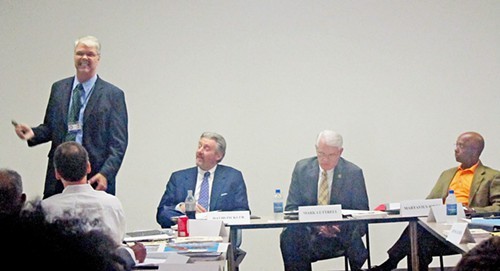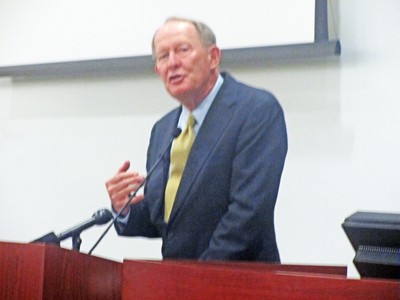
- JB
- Aitken (standing) at Planning Commission meeting; seated are David Pickler of SCS, Shelby County Mayor Mark Luttrell, and Martavius Jones of MCS.
Let’s get down to cases here. My colleague John Branston has presented some well-distilled arguments for large school districts. If memory serves right, the consolidated Memphis City Schools-Shelby County Schools district, if taken at full (i.e., with no dropouts) would be the 18th largest in the United States.
That’s the figure that was incessantly cited early in the year by state Senator Mark Norris (he of Norris-Todd), and while it doesn’t quite put a Greater Shelby County School District in the Top Ten, Number 18 is large enough — though, when Norris, in the course of pitching his bill, thought to be pejorative by projecting such a district as on a par with the Greater Dallas school district, I confess I was baffled.
What was wrong, exactly, in being reckoned on the same scale with a recognized (and presumably prosperous) monolith elsewhere in the Southland? How many of us would trade the whole of the Liberty Bowl (scattered football crowds and all) for Jerry Jones’ mammoth new Jumbatron?
Even so, we could surely construct lists of pros and cons for a large district and argue the point. In his patented succinct manner, John makes the case for large, while erstwhile Shelby County Schools board candidate (and recent applicant for the big board) Ken Hoover demurs in a series of comments.
Arguments for either side of this debate have their merit. But to wax dialectical on the choice may have more in common with the old medievalist arguments about the number of angels on the head of a pin than with decisions regarding reality. Consider:
One of the members of the new Greater Shelby County School Board is Mike Wissman, a first-term SCS Board member and the newly elected mayor of Arlington. Wissman’s city is one of several suburban municipalities whose governments have recently concluded pacts with the consulting firm of Southern Education Strategies as a first step toward creating a school system independent of the Greater Shelby district.
True, no concrete plan has yet been hatched, as Wissman pointed out when asked about it Thursday, at the conclusion of the SCS Board’s last meeting (make that the last meeting of the old SCS Board, since Board members voted on Thursday, judicial decree or no judicial decree, to regard the new 23-member as an extension of themselves rather than as something new).
But Wissman did not dissemble about his— and his city’s — ultimate intent, not only to create an independent public-school system for Arlington, but to merge that system with those of other jurisdictional units in outer Shelby County. In fact, he imagines that all of the territory that, up until now, has been that of Shelby County Schools, can and will be recreated intact.
City boundaries vis-à-vis unincorporated areas should be no obstacle, Wissman suggested. “I imagine we can find the way to associate with each other so as to keep the same thing we have right now.”
And Wissman is no Lone Ranger. The same thought is doubtless on other suburban minds, including those of fellow board members on the new “extended” 23-member body. Yes, former SCS chairman-for-life David Pickler is still singing verse s of Kumbaya and hailing the virtues of Love, Togetherness, and Common Interest vis-à-vis the new Greater Shelby system, but it is hard to see how he could easily forswear allegiance to a brand-new special school district encompassing all of the territory governed up to now by SCS (the old SCS, of course). After all, just that is what he striven to achieve for more than a decade.
SCS superintendent John Aitken has acknowledged that he would be interested in becoming superintendent of a Greater Shelby school district. He also acknowledges, when asked, that he would consider heading up some other version of a school system in Shelby County. “There are a lot of roads leading a lot of places,” he said the other day.
And there’s Bartlett mayor Keith McDonald — who, like Wissman, is avowedly thinking out loud on behalf of his city and the suburban population at large. McDonald is a member of the 21-member Planning Commission, whose exact authority is still being debated but whose existence is an integral part of the Norris-Todd legislation, which (let us not forget) posits the creation of one or more special school districts as the last act of “merger.”
Given that McDonald’s city has also contracted with Southern Education Strategies and that the mayor himself is unapologetically stumping for separating Bartlett’s public schools from those of the Greater Shelby district. Given further that McDonald argues that the school buildings and related infrastructure currently in use by SCS should be considered the property of their current locales without further expenses (he bases that reasoning on the 3:1 capital expenditure split dictated by the state’s Average Daily Attendance formula), it is no brain-teaser to see what sort of planning he intends to commit.
Indeed, after presentations had been made by representatives of the SCS and MCS administrations at the first meeting of the Planning Commission on Thursday (Aitken for SCS, deputy superintendent Irving Hamer for MCS), McDonald asked the first question, a clearly pointed one of Hamer, regarding the city system’s per-pupil expenditures.
It should not be imagined that McDonald, who no doubt envisions a meaner, cleaner, frills-free, cost-efficient district for his city, was unduly impressed by the add-on funding , from Bill and Melinda Gates or whoever, that currently augments the heavily programmatic, “reform”-minded, administratively deep workings of the MCS system. Nor, presumably, was he moved to think “Eureka!” concerning the grandiose claims made for MCS by Hamer (a dropout rate of 1percent? Really?).
McDonald and Wissman and an indeterminate number others on both the new 23-member Board and the new 21-0member Planning Commission are biding time and looking past the still distant date of September 1, 2013. And their watchword at that point is less likely to be Kumbaya then than it is to be See Ya.







